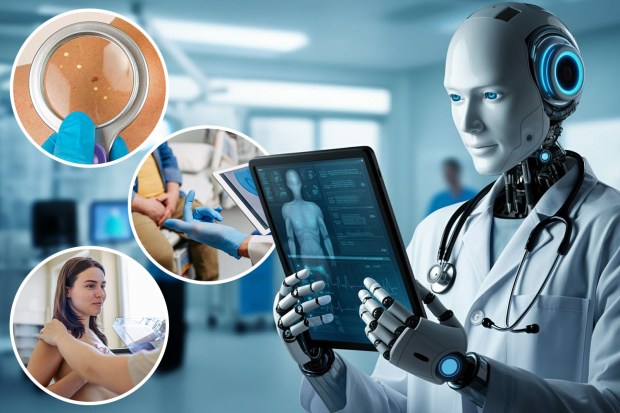Science
AI Revolutionizes Cancer Care with Faster Diagnosis and Treatments

Artificial intelligence (AI) is rapidly transforming cancer care, enhancing research, diagnosis, and treatment methods. In a significant move, the National Health Service (NHS) recently announced the implementation of cutting-edge AI tools to deliver “faster and smarter care” to millions of patients. This initiative will include a major trial involving 700,000 women to identify potential signs of breast cancer.
AI is not only aiding in early detection but is also paving the way for innovative treatments. Recent studies suggest that AI may soon be able to detect throat cancer through voice analysis. Additionally, researchers have developed an AI-modelled personalized vaccine for melanoma that is nearing clinical application.
AI’s Role in Research and Prevention
Preventing cancer and detecting it early are crucial for effective treatment. Research labs are inundated with vast amounts of data, seeking patterns in genetic codes and historical patient information. Traditionally, this process has been labor-intensive, but AI significantly accelerates it.
Professor Nuria Lopez-Bigas from Spain’s Institute for Research in Biomedicine notes, “Before AI, we would look at a patient’s tumour and guess which mutations to experiment on and see what happened, but it was slow.” AI can now analyze thousands of tumors globally, identifying patterns that indicate which mutations drive cancer. This advancement could shorten research timelines by years or even decades.
At King’s College London, researchers utilized ChatGPT-4 to discover new drug combinations for breast cancer treatment. By mining data from previous studies, they identified twelve untested combinations, seven of which showed promise in laboratory tests. The Institute for Cancer Research has trained AI to assess how various medications alter the shape of cancer cells, achieving a remarkable accuracy rate of 99 percent. This technology could potentially reduce pre-human testing time from three years to just three months.
AI Advancements in Diagnosis and Treatment
The NHS is leveraging AI to expedite cancer diagnoses. AI systems can detect subtle pixel variations in imaging scans, revealing details that may go unnoticed by human eyes. The National Institute for Health and Care Excellence (NICE) has encouraged hospitals to adopt AI for mole examinations. A system known as DERM analyzes smartphone images against a large database to assist doctors in determining whether moles are cancerous.
Current trials are also exploring AI’s ability to identify lung, breast, and prostate cancers earlier. “AI is helping massively,” says Dr. Joe Barnett, a radiologist at the Royal Free NHS Trust in London. “Instead of needing two radiologists, we can use one plus the AI system.” This integration allows physicians to focus more on analyzing potential cancerous findings.
In a separate study, researchers at Oregon Health and Science University trained an algorithm to detect early signs of throat cancer by analyzing voice recordings. This innovative approach demonstrates the expanding scope of AI in oncology.
While AI cannot yet perform cancer treatments, it significantly aids healthcare professionals in making informed decisions. Innovative terms such as “precision,” “personalized,” and “tailored” medicine are becoming more prevalent in this field, emphasizing individualized treatment plans based on a patient’s unique genetic makeup.
The American Society of Clinical Oncology has developed a ChatGPT-style tool to assist doctors. By inputting patient data, oncologists receive a curated list of treatment options derived from the latest scientific research. “AI won’t replace oncologists, but those who use it will replace those who don’t,” states Dr. Julie Gralow, a breast cancer specialist and President of the Association for Clinical Oncology.
Furthermore, AI is being integrated into surgical practices, with robotic systems increasingly employed in cancer operations. For instance, leading robotics manufacturer Intuitive is utilizing AI to enhance surgical performance by providing feedback to surgeons. In July, scientists at Johns Hopkins University programmed a robot to conduct an imitation surgery autonomously, marking a significant milestone in surgical AI.
As AI continues to evolve, it holds the promise of reshaping cancer care in ways previously thought unattainable. The Cancer Research Institute describes this integration as an “emerging revolution” that will significantly alter our understanding, diagnosis, and treatment of cancer.
Professor Lopez-Bigas expresses optimism about the future, stating, “I have a feeling that the biggest leap is yet to come.”
Regular screenings remain essential for early cancer detection. The NHS offers three national screening programs in England: cervical, breast, and bowel screenings. These initiatives aim to identify potential health issues before symptoms arise, ultimately improving treatment efficacy and patient outcomes.
-

 World2 weeks ago
World2 weeks agoCoronation Street’s Shocking Murder Twist Reveals Family Secrets
-

 Entertainment1 week ago
Entertainment1 week agoAndrew Pierce Confirms Departure from ITV’s Good Morning Britain
-

 Entertainment5 months ago
Entertainment5 months agoKate Garraway Sells £2 Million Home Amid Financial Struggles
-

 Entertainment4 months ago
Entertainment4 months agoAnn Ming Reflects on ITV’s ‘I Fought the Law’ Drama
-

 Entertainment1 month ago
Entertainment1 month agoCoronation Street Fans React as Todd Faces Heartbreaking Choice
-

 Health4 months ago
Health4 months agoKatie Price Faces New Health Concerns After Cancer Symptoms Resurface
-

 World1 month ago
World1 month agoBailey Announces Heartbreaking Split from Rebecca After Reunion
-

 Entertainment2 weeks ago
Entertainment2 weeks agoTwo Stars Evicted from I’m A Celebrity Just Days Before Finale
-

 Entertainment4 months ago
Entertainment4 months agoCoronation Street’s Carl Webster Faces Trouble with New Affairs
-

 World2 weeks ago
World2 weeks agoKevin Sinfield Exceeds Fundraising Goal Ahead of Final Marathons
-

 Entertainment4 months ago
Entertainment4 months agoWhere is Tinder Swindler Simon Leviev? Latest Updates Revealed
-

 Entertainment5 months ago
Entertainment5 months agoMarkiplier Addresses AI Controversy During Livestream Response





















